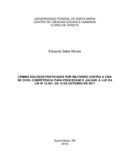| dc.contributor.advisor | Espindola, Angela Araujo da Silveira | |
| dc.contributor.advisor | Assis, Jorge Cesar de | |
| dc.creator | Morais, Eduarda Gabe | |
| dc.date.accessioned | 2019-08-07T14:57:14Z | |
| dc.date.available | 2019-08-07T14:57:14Z | |
| dc.date.issued | 2018-07-02 | |
| dc.date.submitted | 2018 | |
| dc.identifier.uri | http://repositorio.ufsm.br/handle/1/17756 | |
| dc.description | Trabalho de conclusão de curso (graduação) - Universidade Federal de Santa Maria, Centro de Ciências Sociais e Humanas, Curso de Direito, RS, 2018. | por |
| dc.description.abstract | The jurisdiction of the military justice has always been the subject of great doctrinal and jurisprudential discussion. When performing a historical retrospective, covering different periods of our Republic, it is possible to verify significant changes of military criminal acts over the years. Among them, those brought by Law no. 9.299/1996 and by Constitutional Amendment no. 45/2004, which were responsible for the displacement of the competence to prosecute and judge intentional crime against the life of civil, military justice to the ordinary justice. The theme, already pacified for the military, remained obscure for members of the Armed Forces, generating successive conflicts of competence, considering the different interpretations on the subject. In the midst of this discussion, and because of the recurrent use of Armed Forces in public security, was recently sanctioned the Law 13.491/2017, which substantially expanded the jurisdiction of the military justice system, at the time of amending the concept of military crime. Using the logical-deductive method, from doctrinal construction, jurisprudence and normative, in addition to complete the constitutionality of the law, although reactions in the opposite direction, it was felt that the jurisdiction shall be the court of the Jury when the intentional crime against the civilian life is practiced by state military. On the other hand, when committed by federal military, provided that within the hypotheses outlined in section II of the new Article 9 of the Military Penal Code, the competence for the processing and judgment will be of Military Justice of the Union, leaving a visible difference of treatment between members of the Armed Forces and the military. | eng |
| dc.language | por | por |
| dc.publisher | Universidade Federal de Santa Maria | por |
| dc.rights | Acesso Aberto | por |
| dc.subject | Competência | por |
| dc.subject | Crimes dolosos contra a vida de civil | por |
| dc.subject | Justiça militar | por |
| dc.subject | Lei nº 13.491/2017 | por |
| dc.subject | Competence | eng |
| dc.subject | Willful crimes against civilian life | eng |
| dc.subject | The military justice | eng |
| dc.subject | Law no. 13.491/2017 | eng |
| dc.title | Crimes dolosos praticados por militares contra a vida de civis: competência para processar e julgar, à luz da lei nº 13.491, de 13 de outubro de 2017 | por |
| dc.title.alternative | Intentional crimes committed by soldiers against the civilian life: jurisdiction to prosecute and judge, in the light of the law no. 13,491, of 13 october 2017 | eng |
| dc.type | Trabalho de Conclusão de Curso de Graduação | por |
| dc.degree.local | Santa Maria, RS, Brasil | por |
| dc.degree.graduation | Direito | por |
| dc.description.resumo | A competência da Justiça Castrense sempre foi tema de grande discussão doutrinária e jurisprudencial. Ao realizar uma retrospectiva histórica, abarcando diferentes períodos da nossa República, é possível verificar significativas alterações dos diplomas penais militares ao longo dos anos. Dentre elas, aquelas trazidas pela Lei nº 9.299/1996 e pela Emenda Constitucional nº 45/2004, as quais foram responsáveis pelo deslocamento da competência para processar e julgar crime doloso contra a vida de civil, da Justiça Militar à Justiça Comum. O tema, já pacificado para os militares dos Estados, continuou obscuro para os integrantes das Forças Armadas, gerando sucessivos conflitos de competência, haja vista as diferentes interpretações sobre o assunto. Em meio a essa discussão, e em razão do recorrente uso das Forças Armadas na segurança pública, foi sancionada recentemente a Lei 13.491/2017, que ampliou substancialmente a competência da Justiça Militar, no momento em que altera o conceito de crime militar. Utilizando-se o método lógico-dedutivo, a partir de construção doutrinária, jurisprudencial e normativa, além de concluir pela constitucionalidade da lei, apesar de reações em sentido contrário, entendeu-se que a competência será do Tribunal do Júri quando o crime doloso contra a vida de civil for praticado por militares estaduais. Por outro lado, quando cometidos por militares federais, desde que dentro das hipóteses delineadas no inciso II do novo artigo 9º, do Código Penal Militar, a competência para o processamento e julgamento será da Justiça Castrense da União, restando visível a diferença de tratamento entre os integrantes das Forças Armadas e os militares dos Estados. | por |
| dc.publisher.country | Brasil | por |
| dc.publisher.initials | UFSM | por |
| dc.subject.cnpq | CNPQ::CIENCIAS SOCIAIS APLICADAS::DIREITO | por |
| dc.publisher.unidade | Centro de Ciências Sociais e Humanas | por |


